外研版(2019)选择性必修四Unit1 Looking forwards Period1Starting out & Understanding ideas—Reading comprehensio
文档属性
| 名称 | 外研版(2019)选择性必修四Unit1 Looking forwards Period1Starting out & Understanding ideas—Reading comprehensio |
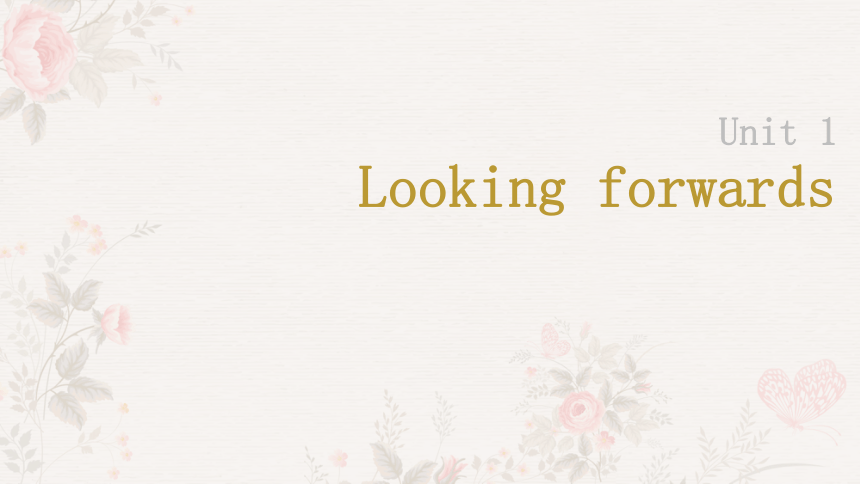
|
|
| 格式 | pptx | ||
| 文件大小 | 36.6MB | ||
| 资源类型 | 教案 | ||
| 版本资源 | 外研版(2019) | ||
| 科目 | 英语 | ||
| 更新时间 | 2023-05-23 00:00:00 | ||
图片预览

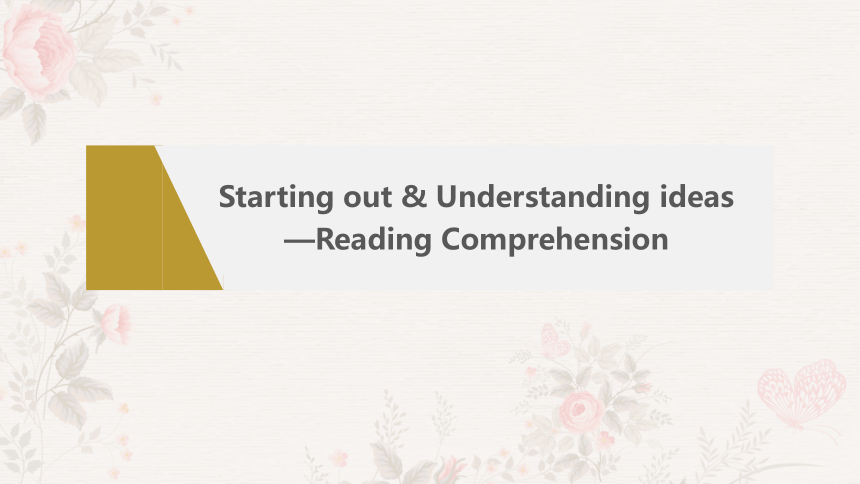
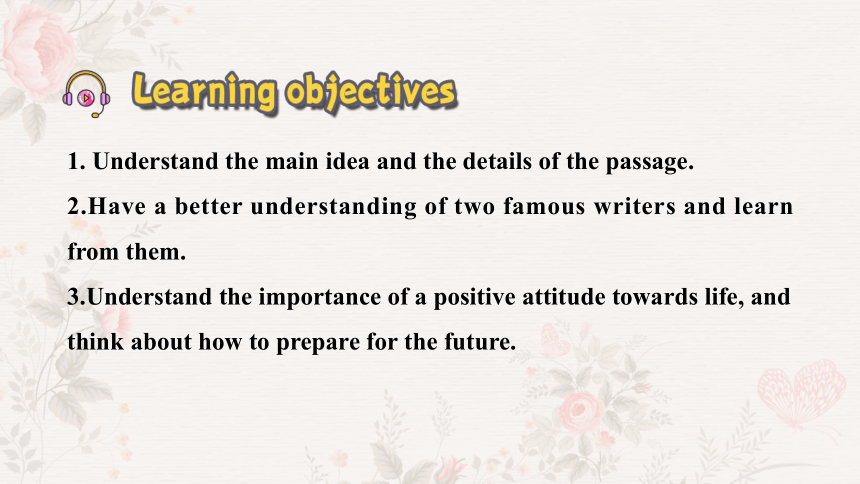
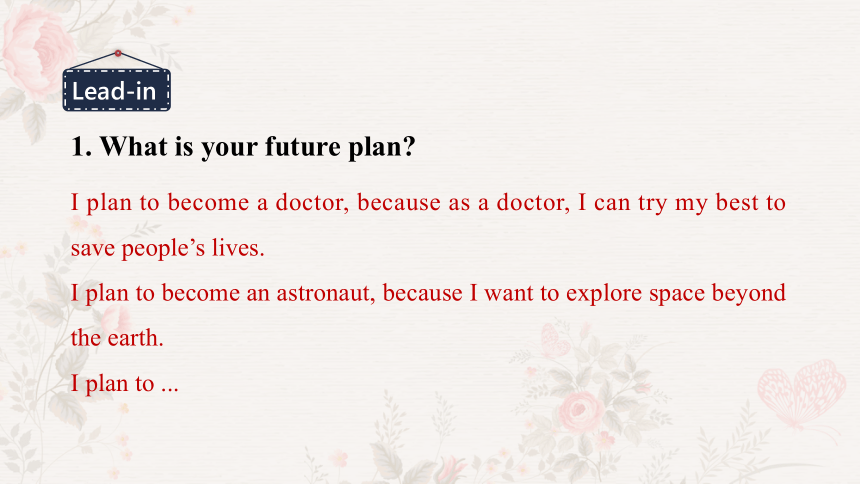
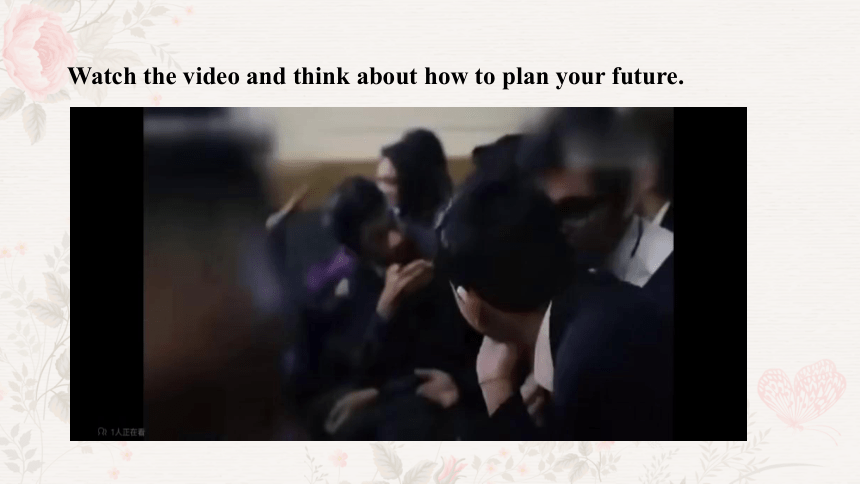

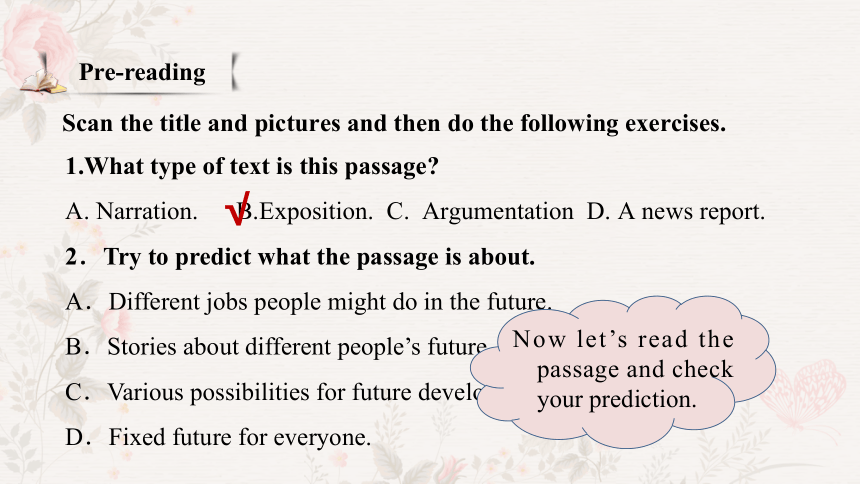
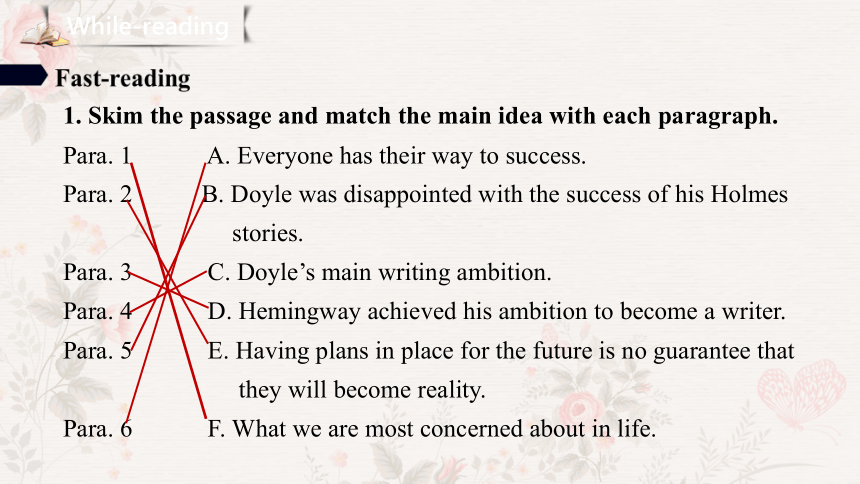
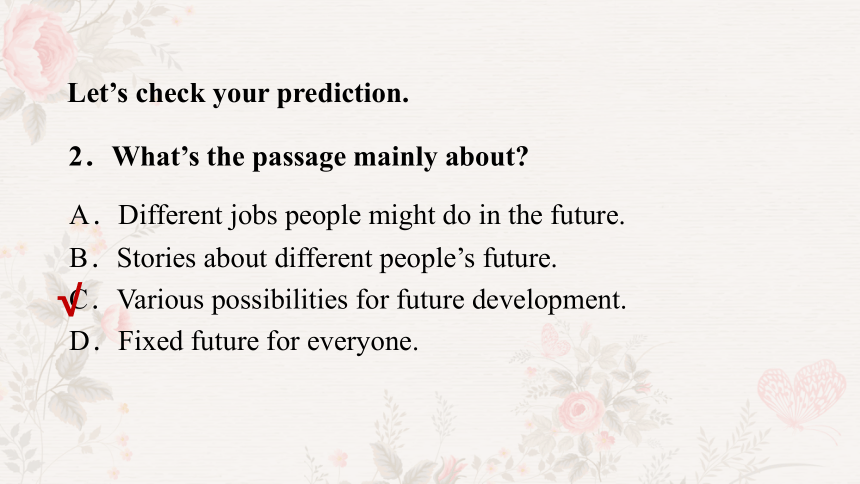
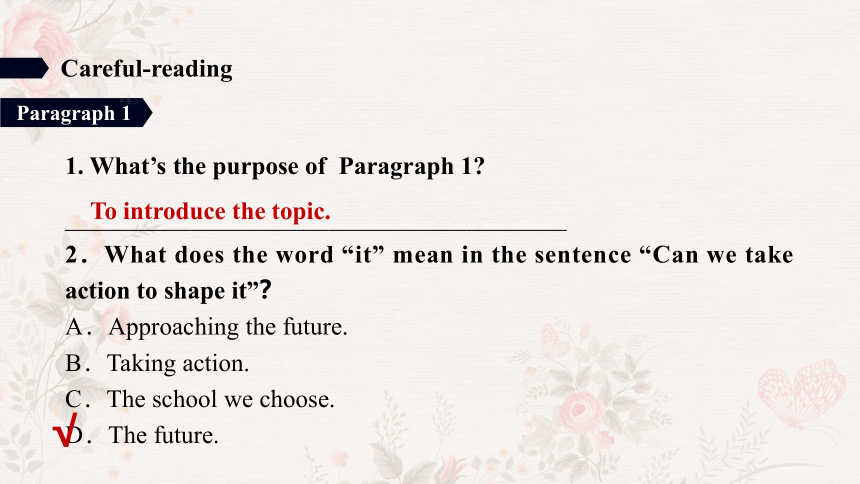
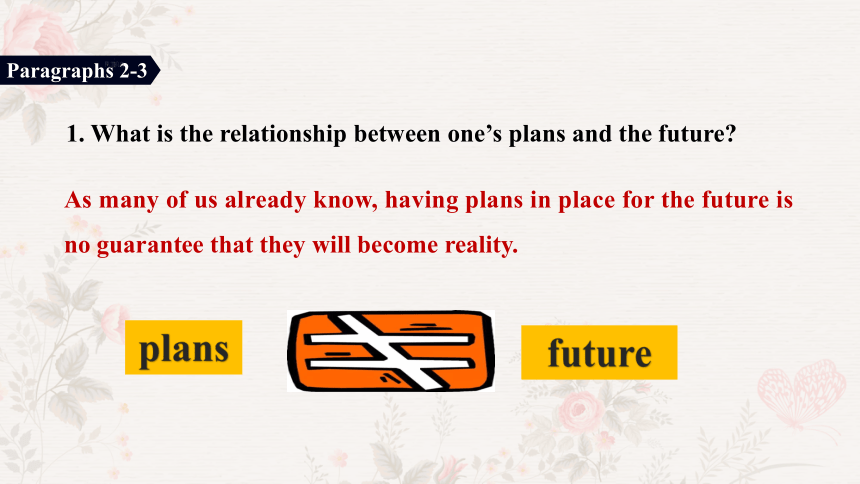

文档简介
(共37张PPT)
Looking forwards
Unit 1
Starting out & Understanding ideas
—Reading Comprehension
1. Understand the main idea and the details of the passage.
2.Have a better understanding of two famous writers and learn from them.
3.Understand the importance of a positive attitude towards life, and think about how to prepare for the future.
1. What is your future plan
I plan to become a doctor, because as a doctor, I can try my best to save people’s lives.
I plan to become an astronaut, because I want to explore space beyond the earth.
I plan to ...
Lead-in
Lead-in
Watch the video and think about how to plan your future.
Facing the future, we should know that everything happens at its own pace. So we should be patient.
The most important is that we should be able to create a meaningful life for ourselves and try to make a difference to others.
2.How should you plan your future
1.What type of text is this passage
A. Narration. B.Exposition. C. Argumentation D. A news report.
2.Try to predict what the passage is about.
A.Different jobs people might do in the future.
B.Stories about different people’s future.
C.Various possibilities for future development.
D.Fixed future for everyone.
Now let’s read the passage and check your prediction.
Pre-reading
Scan the title and pictures and then do the following exercises.
√
1. Skim the passage and match the main idea with each paragraph.
Para. 1 A. Everyone has their way to success.
Para. 2 B. Doyle was disappointed with the success of his Holmes
stories.
Para. 3 C. Doyle’s main writing ambition.
Para. 4 D. Hemingway achieved his ambition to become a writer.
Para. 5 E. Having plans in place for the future is no guarantee that
they will become reality.
Para. 6 F. What we are most concerned about in life.
While-reading
2.What’s the passage mainly about
A.Different jobs people might do in the future.
B.Stories about different people’s future.
C.Various possibilities for future development.
D.Fixed future for everyone.
Let’s check your prediction.
√
1. What’s the purpose of Paragraph 1
________________________________________
2.What does the word “it” mean in the sentence “Can we take action to shape it”?
A.Approaching the future.
B.Taking action.
C.The school we choose.
D.The future.
To introduce the topic.
√
Careful-reading
Paragraph 1
plans
future
Paragraphs 2-3
1. What is the relationship between one’s plans and the future
As many of us already know, having plans in place for the future is no guarantee that they will become reality.
2. Decide whether the following statements about Hemingway are T(True) or F(False).
(1)On leaving high school,Hemingway became foreign correspondent for the Toronto Star. ( )
(2)His novel The Old Man and the Sea won the Nobel Prize in Literature. ( )
(3)He is 40 years junior to Doyle. ( )
(4)He was interested in writing from childhood. ( )
(5)He was once a fisherman and caught a big fish. ( )
F
F
T
T
F
Date of Birth:(1)_________
Nationality:(2)___________
Ambition :(3)_____________
Experiences and achievements:
joined a local newspaper as(4)_________________
became (5)__________________ for the Toronto Star
wrote novels and short stories based on (6)________________
The Old Man and the Sea, about (7) ______________________
________________won the Pulitzer Prize.
won the Nobel Prize in (8) ________.
1899
America
writer
a trainee reporter
foreign correspondent
his personal experiences
the struggle between an elderly
Literature
fisherman and the fish
3. Fill in the blanks and retell the profile(简介) of Ernest Hemingway.
1. Arthur Conan Doyle __________.
A.was best known for his historical novels
B.was born in Scotland in 1899
C.began to write his detective novels when he worked as a doctor
D.had an ambition to become a writer of detective novels
√
Paragraphs 4-5
Date of Birth: (1)_________
Nationality: (2)_________
Original job:(3)_________
Ambition:(4)__________________
Best-known work:(5)____________________
1859
Scotland
doctor
a writer of historical novels
stories of Sherlock Holmes
2. Fill in the blanks about the profile(简介) of Arthur Conan Doyle.
He gave up medicine and (1)_________________________; longed to become known for his (2)________________.
Doyle’s decision
The public’s reaction
They couldn’t (5)______________
Sherlock Holmes.
He (3)__________the detective to focus on his “serious” writing.
The fans were so (6)_______.Holmes has been (7)_____________
readers.
He was forced to (4)________
___________________________.
devoted himself to writing
historical novels
get enough of
killed off
angry
Holmes back from the dead
entertaining
bring
3.Organise information from the passage and complete the charts.
4. What can we learn from the story of Doyle
A.Practice makes perfect.
B.Rome was not built in a day.
C.Where there is a will, there is a way.
D.The future may not turn out exactly as we plan.
√
So, whatever difficulty you might meet with, follow the examples of these two authors and make preparations for the unexpected.
So, whatever twists and turns you might encounter, take a leaf out of the books of these two authors and be prepared for the unexpected.
2.What rhetorical device(修辞手法) does the author use in this sentence
A.Personification(拟人). B.Metaphor(隐喻).
C.Hyperbole(夸张). D.Parallelism(排比).
follow the example of
√
Paragraph 6
1. Paraphrase: Try to explain the sentence in your own words.
你无法预见性地将生命中的点滴串联起来,只有在回头看时,你才会发现这些点滴之间的联系。所以你要坚信,你现在所经历的,将在你未来的生命中串联起来。
You can’t connect the dots looking forward; you can only connect them looking backwards. So you have to trust that the dots will somehow connect in your future.
3. Translate Steve Jobs’ words into Chinese.
4.What’s your understanding of his words
What we went through in the past can be connected with our future.
What’s the structure of the passage
=para
2
4
1
5
2
4
3
1
1
3
2
4
1
2
3
4
5
3
5
5
6
6
6
6
Structure
A. B. C. D.
√
Introduction
Main body
Conclusion
Two examples
Author’s opinion
Structure
Similarities
They both (1)_______________________.
They shared (2)____________________________________________.
were ultimately successful
the same ambitious and energetic approach to life
1.Please summarize the similarities between Hemingway and Doyle.
The whole passage
2. What’s the purpose of the passage
A.To prove that future doesn’t necessarily turn out as planned.
B.To call on readers to read their books.
C.To compare the differences between the two authors.
D.To tell readers to prepare for future whatever happens.
√
1.What can you learn about facing the future from the two authors (Critical thinking)
Post-reading
Discussion
On the way to success, we should get prepared for the unexpected and something may not turn out as planned.
2.What will you do to prepare yourself for the future (Creative thinking)
I will keep up a good state of mind and get prepared for the unexpected because I know everything can’t turn out as expected.
Empower ourselves and embrace a fruitful future!
Handle your present with confidence and face your future without fear. Look forward to the future and look forward to the unknown.
Make your future bright!
Dream it possible!
Reflection
As is known to all, what we have planned does not necessarily agree with 1. we will become. Let’s take two famous authors Ernest Hemingway and Arthur Conan Doyle for example. Although they shared 2. same ambitious and energetic approach to life, their careers unfolded in contrasting 3. (way).
Born in 1899, Ernest Hemingway had the ambition 4._______ (write) from early boyhood. On leaving high school, he first worked as a trainee reporter in a local newspaper, and then became a foreign correspondent. He wrote many novels and short stories 5.________ (base) on his personal experiences,among 6. The Old Man and the Sea won the Pulitzer Prize for Fiction in 1953.
what
the
ways
to write
based
which
Summary
Born in Scotland in 1859, Arthur Conan Doyle had 7._________ (original) worked as a doctor. But his main ambition was to become a writer of 8._________(history) novels. Although some of his historical novels were published, their success was nothing compared to the stories of his fictional detective, Sherlock Holmes, which he is still 9._____(well) known for to this day.
Both of them were ultimately successful, but their paths to 10._______(succeed) were very different, their futures not necessarily turning out exactly as they planned.
success
originally
historical
best
For many of us, it’s something we already have experienced. One moment, we are lying comfortably in bed, about to fall into a deep sleep. The next, our eyes are open and we find ourselves wondering or even worrying about possibly the most important issue of our lives—the future. Will we get into the school of our choice What will we be doing in ten years’ time Can we become the person we really want to be In the face of such questions, how should we approach the future Can we take action to shape it, or should we just accept whatever comes our way
定语从句
面对
find+宾语+宾语补足语
定语从句
宾语从句
采取行动
Analyze the key points of the text
Para. 1
As many of us already know, having plans in place for the future is no guarantee that they will become reality. In this respect, some people are more fortunate than others, as can be illustrated by comparing the lives of two famous authors, born 40 years apart. Although they shared the same ambitious and energetic approach to life, their careers unfolded in contrasting ways.
动名词短语作主语
定语从句
非限制性定语从句
过去分词短语作定语
让步状语从句
Para. 2
同位语从句,对名词guarantee的内容进行解释说明
The American author, Ernest Hemingway, born in 1899, was from early boyhood single-minded in his ambition to write. On leaving high school, he joined a local Kansas newspaper as a trainee reporter. He went on to become foreign correspondent for the Toronto Star and used his extraordinary experiences in Europe and later Cuba to inform his writing. In his words, “ I decided that I would write one story about each thing that I knew about.”
Para. 3
过去分词短语作定语
宾语从句
Having set himself this goal, he wrote novels and short stories based on his personal experiences of the First World War, the Spanish Civil War, bullfighting and deep-sea fishing, amongst others. His short novel The Old Man and the Sea, about the three-day epic struggle between an elderly fisherman and the biggest fish he had ever caught, won the Pulitzer Prize for Fiction in 1953. He would later go on to win the Nobel Prize in Literature.
过去分词短语作定语
定语从句
现在分词短语作状语
Para. 3
By contrast, the young Authur Conan Doyle, born in Scotland in 1859, had originally worked as a doctor. But Doyle’ s main ambition was to become a writer of historical novels. Although some of his historical novels were published, their success was nothing compared to the stories of his fictional detective, Sherlock Holmes, which he is still best known for to this day.
相比之下;与之相比
过去分词短语作定语
让步状语从句
过去分词短语作状语
同位语
非限制性定语从句
Para. 4
Interestingly, Doyle wrote some of his early Holmes stories while he was waiting for patients in his medical practice in London. After Sherlock Holmes made him a household name, Doyle gave up medicine and devoted himself entirely to writing. He still longed to become known for his historical novels amongst other academic works. The public, however, couldn’t get enough of Sherlock Holmes.
时间状语从句
致力于
时间状语从句
渴望
Para. 5
In desperation, Doyle killed off the famous detective in a novel published in 1893 so that he could focus on his “serious” writing. However, fans of Holmes were so angry that Doyle, under immense pressure, was forced to bring Holmes back from the dead. Doyle’s many historical novels, plays, poems and academic papers have remained largely forgotten, but Sherlock Holmes has been entertaining readers for well over a century.
过去分词短语作定语
目的状语从句
结果状语从句
Para. 5
Though both of these men were ultimately successful, their paths to success were very different, their futures not necessarily turning out exactly as they planned. So, whatever twists and turns you might encounter, take a leaf out of the books of these two authors and be prepared for the unexpected. As renowned tech innovator Steve Jobs once said, “You can’t connect the dots looking forward; you can only connect them looking backwards. So you have to trust that the dots will somehow connect in your future. ”
让步状语从句
让步状语从句
独立主格结构
非限制性定语从句
宾语从句
方式状语从句
Para. 6
Homework
Preview language points and recite the key points of the text.
Looking forwards
Unit 1
Starting out & Understanding ideas
—Reading Comprehension
1. Understand the main idea and the details of the passage.
2.Have a better understanding of two famous writers and learn from them.
3.Understand the importance of a positive attitude towards life, and think about how to prepare for the future.
1. What is your future plan
I plan to become a doctor, because as a doctor, I can try my best to save people’s lives.
I plan to become an astronaut, because I want to explore space beyond the earth.
I plan to ...
Lead-in
Lead-in
Watch the video and think about how to plan your future.
Facing the future, we should know that everything happens at its own pace. So we should be patient.
The most important is that we should be able to create a meaningful life for ourselves and try to make a difference to others.
2.How should you plan your future
1.What type of text is this passage
A. Narration. B.Exposition. C. Argumentation D. A news report.
2.Try to predict what the passage is about.
A.Different jobs people might do in the future.
B.Stories about different people’s future.
C.Various possibilities for future development.
D.Fixed future for everyone.
Now let’s read the passage and check your prediction.
Pre-reading
Scan the title and pictures and then do the following exercises.
√
1. Skim the passage and match the main idea with each paragraph.
Para. 1 A. Everyone has their way to success.
Para. 2 B. Doyle was disappointed with the success of his Holmes
stories.
Para. 3 C. Doyle’s main writing ambition.
Para. 4 D. Hemingway achieved his ambition to become a writer.
Para. 5 E. Having plans in place for the future is no guarantee that
they will become reality.
Para. 6 F. What we are most concerned about in life.
While-reading
2.What’s the passage mainly about
A.Different jobs people might do in the future.
B.Stories about different people’s future.
C.Various possibilities for future development.
D.Fixed future for everyone.
Let’s check your prediction.
√
1. What’s the purpose of Paragraph 1
________________________________________
2.What does the word “it” mean in the sentence “Can we take action to shape it”?
A.Approaching the future.
B.Taking action.
C.The school we choose.
D.The future.
To introduce the topic.
√
Careful-reading
Paragraph 1
plans
future
Paragraphs 2-3
1. What is the relationship between one’s plans and the future
As many of us already know, having plans in place for the future is no guarantee that they will become reality.
2. Decide whether the following statements about Hemingway are T(True) or F(False).
(1)On leaving high school,Hemingway became foreign correspondent for the Toronto Star. ( )
(2)His novel The Old Man and the Sea won the Nobel Prize in Literature. ( )
(3)He is 40 years junior to Doyle. ( )
(4)He was interested in writing from childhood. ( )
(5)He was once a fisherman and caught a big fish. ( )
F
F
T
T
F
Date of Birth:(1)_________
Nationality:(2)___________
Ambition :(3)_____________
Experiences and achievements:
joined a local newspaper as(4)_________________
became (5)__________________ for the Toronto Star
wrote novels and short stories based on (6)________________
The Old Man and the Sea, about (7) ______________________
________________won the Pulitzer Prize.
won the Nobel Prize in (8) ________.
1899
America
writer
a trainee reporter
foreign correspondent
his personal experiences
the struggle between an elderly
Literature
fisherman and the fish
3. Fill in the blanks and retell the profile(简介) of Ernest Hemingway.
1. Arthur Conan Doyle __________.
A.was best known for his historical novels
B.was born in Scotland in 1899
C.began to write his detective novels when he worked as a doctor
D.had an ambition to become a writer of detective novels
√
Paragraphs 4-5
Date of Birth: (1)_________
Nationality: (2)_________
Original job:(3)_________
Ambition:(4)__________________
Best-known work:(5)____________________
1859
Scotland
doctor
a writer of historical novels
stories of Sherlock Holmes
2. Fill in the blanks about the profile(简介) of Arthur Conan Doyle.
He gave up medicine and (1)_________________________; longed to become known for his (2)________________.
Doyle’s decision
The public’s reaction
They couldn’t (5)______________
Sherlock Holmes.
He (3)__________the detective to focus on his “serious” writing.
The fans were so (6)_______.Holmes has been (7)_____________
readers.
He was forced to (4)________
___________________________.
devoted himself to writing
historical novels
get enough of
killed off
angry
Holmes back from the dead
entertaining
bring
3.Organise information from the passage and complete the charts.
4. What can we learn from the story of Doyle
A.Practice makes perfect.
B.Rome was not built in a day.
C.Where there is a will, there is a way.
D.The future may not turn out exactly as we plan.
√
So, whatever difficulty you might meet with, follow the examples of these two authors and make preparations for the unexpected.
So, whatever twists and turns you might encounter, take a leaf out of the books of these two authors and be prepared for the unexpected.
2.What rhetorical device(修辞手法) does the author use in this sentence
A.Personification(拟人). B.Metaphor(隐喻).
C.Hyperbole(夸张). D.Parallelism(排比).
follow the example of
√
Paragraph 6
1. Paraphrase: Try to explain the sentence in your own words.
你无法预见性地将生命中的点滴串联起来,只有在回头看时,你才会发现这些点滴之间的联系。所以你要坚信,你现在所经历的,将在你未来的生命中串联起来。
You can’t connect the dots looking forward; you can only connect them looking backwards. So you have to trust that the dots will somehow connect in your future.
3. Translate Steve Jobs’ words into Chinese.
4.What’s your understanding of his words
What we went through in the past can be connected with our future.
What’s the structure of the passage
=para
2
4
1
5
2
4
3
1
1
3
2
4
1
2
3
4
5
3
5
5
6
6
6
6
Structure
A. B. C. D.
√
Introduction
Main body
Conclusion
Two examples
Author’s opinion
Structure
Similarities
They both (1)_______________________.
They shared (2)____________________________________________.
were ultimately successful
the same ambitious and energetic approach to life
1.Please summarize the similarities between Hemingway and Doyle.
The whole passage
2. What’s the purpose of the passage
A.To prove that future doesn’t necessarily turn out as planned.
B.To call on readers to read their books.
C.To compare the differences between the two authors.
D.To tell readers to prepare for future whatever happens.
√
1.What can you learn about facing the future from the two authors (Critical thinking)
Post-reading
Discussion
On the way to success, we should get prepared for the unexpected and something may not turn out as planned.
2.What will you do to prepare yourself for the future (Creative thinking)
I will keep up a good state of mind and get prepared for the unexpected because I know everything can’t turn out as expected.
Empower ourselves and embrace a fruitful future!
Handle your present with confidence and face your future without fear. Look forward to the future and look forward to the unknown.
Make your future bright!
Dream it possible!
Reflection
As is known to all, what we have planned does not necessarily agree with 1. we will become. Let’s take two famous authors Ernest Hemingway and Arthur Conan Doyle for example. Although they shared 2. same ambitious and energetic approach to life, their careers unfolded in contrasting 3. (way).
Born in 1899, Ernest Hemingway had the ambition 4._______ (write) from early boyhood. On leaving high school, he first worked as a trainee reporter in a local newspaper, and then became a foreign correspondent. He wrote many novels and short stories 5.________ (base) on his personal experiences,among 6. The Old Man and the Sea won the Pulitzer Prize for Fiction in 1953.
what
the
ways
to write
based
which
Summary
Born in Scotland in 1859, Arthur Conan Doyle had 7._________ (original) worked as a doctor. But his main ambition was to become a writer of 8._________(history) novels. Although some of his historical novels were published, their success was nothing compared to the stories of his fictional detective, Sherlock Holmes, which he is still 9._____(well) known for to this day.
Both of them were ultimately successful, but their paths to 10._______(succeed) were very different, their futures not necessarily turning out exactly as they planned.
success
originally
historical
best
For many of us, it’s something we already have experienced. One moment, we are lying comfortably in bed, about to fall into a deep sleep. The next, our eyes are open and we find ourselves wondering or even worrying about possibly the most important issue of our lives—the future. Will we get into the school of our choice What will we be doing in ten years’ time Can we become the person we really want to be In the face of such questions, how should we approach the future Can we take action to shape it, or should we just accept whatever comes our way
定语从句
面对
find+宾语+宾语补足语
定语从句
宾语从句
采取行动
Analyze the key points of the text
Para. 1
As many of us already know, having plans in place for the future is no guarantee that they will become reality. In this respect, some people are more fortunate than others, as can be illustrated by comparing the lives of two famous authors, born 40 years apart. Although they shared the same ambitious and energetic approach to life, their careers unfolded in contrasting ways.
动名词短语作主语
定语从句
非限制性定语从句
过去分词短语作定语
让步状语从句
Para. 2
同位语从句,对名词guarantee的内容进行解释说明
The American author, Ernest Hemingway, born in 1899, was from early boyhood single-minded in his ambition to write. On leaving high school, he joined a local Kansas newspaper as a trainee reporter. He went on to become foreign correspondent for the Toronto Star and used his extraordinary experiences in Europe and later Cuba to inform his writing. In his words, “ I decided that I would write one story about each thing that I knew about.”
Para. 3
过去分词短语作定语
宾语从句
Having set himself this goal, he wrote novels and short stories based on his personal experiences of the First World War, the Spanish Civil War, bullfighting and deep-sea fishing, amongst others. His short novel The Old Man and the Sea, about the three-day epic struggle between an elderly fisherman and the biggest fish he had ever caught, won the Pulitzer Prize for Fiction in 1953. He would later go on to win the Nobel Prize in Literature.
过去分词短语作定语
定语从句
现在分词短语作状语
Para. 3
By contrast, the young Authur Conan Doyle, born in Scotland in 1859, had originally worked as a doctor. But Doyle’ s main ambition was to become a writer of historical novels. Although some of his historical novels were published, their success was nothing compared to the stories of his fictional detective, Sherlock Holmes, which he is still best known for to this day.
相比之下;与之相比
过去分词短语作定语
让步状语从句
过去分词短语作状语
同位语
非限制性定语从句
Para. 4
Interestingly, Doyle wrote some of his early Holmes stories while he was waiting for patients in his medical practice in London. After Sherlock Holmes made him a household name, Doyle gave up medicine and devoted himself entirely to writing. He still longed to become known for his historical novels amongst other academic works. The public, however, couldn’t get enough of Sherlock Holmes.
时间状语从句
致力于
时间状语从句
渴望
Para. 5
In desperation, Doyle killed off the famous detective in a novel published in 1893 so that he could focus on his “serious” writing. However, fans of Holmes were so angry that Doyle, under immense pressure, was forced to bring Holmes back from the dead. Doyle’s many historical novels, plays, poems and academic papers have remained largely forgotten, but Sherlock Holmes has been entertaining readers for well over a century.
过去分词短语作定语
目的状语从句
结果状语从句
Para. 5
Though both of these men were ultimately successful, their paths to success were very different, their futures not necessarily turning out exactly as they planned. So, whatever twists and turns you might encounter, take a leaf out of the books of these two authors and be prepared for the unexpected. As renowned tech innovator Steve Jobs once said, “You can’t connect the dots looking forward; you can only connect them looking backwards. So you have to trust that the dots will somehow connect in your future. ”
让步状语从句
让步状语从句
独立主格结构
非限制性定语从句
宾语从句
方式状语从句
Para. 6
Homework
Preview language points and recite the key points of the text.
